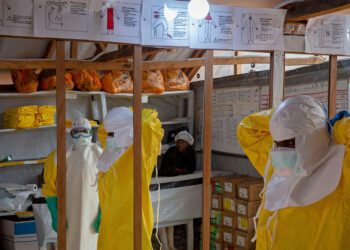A sharp rise in Shiga toxin-producing Escherichia coli (STEC) infections was recorded in England in 2024, new figures from the UK Health Security Agency (UKHSA) show.
There were 2544 culture-confirmed cases, up 26% from the 2018 cases recorded in 2023. Of these, 564 were STEC serotype O157 and 1980 were non-O157 strains.
The UKHSA said the increase was largely due to non-O157 infections, including the largest outbreak linked to contaminated salad leaves. This outbreak resulted in 293 confirmed cases, 126 hospitalisations, 11 cases of haemolytic uraemic syndrome (HUS), and two deaths.
Dr Gauri Godbole, a consultant microbiologist and deputy director for gastrointestinal infections at the UKHSA, said: “While this rise is partly due to one foodborne outbreak, we have been seeing STEC cases gradually increase since 2022.”
Travel-Linked Cases Also Rising
Travel-related cases increased by 60.5%, from 114 in 2023 to 183 in 2024.
The UKHSA said this may reflect changes in international travel patterns or better collection of travel history during investigations. The exact cause remains unclear.
Long-Term Trends
Between 2015 and 2021, the number of O157 confirmed cases had been following a decreasing trend. However, case numbers had increased in recent years.
Non-O157 STEC infections have continued to rise since 2021, nearly tripling since 2019 and continuing a pre-pandemic trend.
As in 2023, the highest incidence of STEC cases in 2024 — both 0157 and non-0157 — was among children aged 1-4 years.
The UKHSA said this may be due to limited prior immunity, less developed hygiene practices, and a greater likelihood of parents seeking healthcare when young children were symptomatic. Contact with animals, particularly at petting farms, may also be a factor.
Causes and Outcomes
The main reservoir for STEC is cattle, although it is also carried by other ruminants such as sheep, goats, and deer. Transmission can occur through direct or indirect contact with animals or their faeces, consumption of contaminated food or water, and person-to-person spread.
In 2024, the UKHSA and partner agencies investigated five outbreaks of non-0157 STEC. Sources were identified for three: contaminated beef, fresh fruit, and salad leaves.
STEC can cause gastroenteritis, with symptoms ranging from mild to bloody diarrhoea, stomach cramps, vomiting, and dehydration. In severe cases, it can cause HUS.
According to the UKHSA, hospitalisation was reported in 27.5% of O157 and 34.3% of non-O157 cases.
HUS occurred in 2.1% of O157 and 1.7% of non-O157 cases.
There were seven deaths: two from O157 and five from non-O157.
Rob Hicks is a retired National Health Service doctor. A well-known TV and radio broadcaster, he has written several books and has regularly contributed to national newspapers, magazines, and online publications. He is based in the United Kingdom.
Source link : https://www.medscape.com/viewarticle/rise-stec-infections-linked-food-and-overseas-travel-2025a1000k9d?src=rss
Author :
Publish date : 2025-07-30 16:17:00
Copyright for syndicated content belongs to the linked Source.










